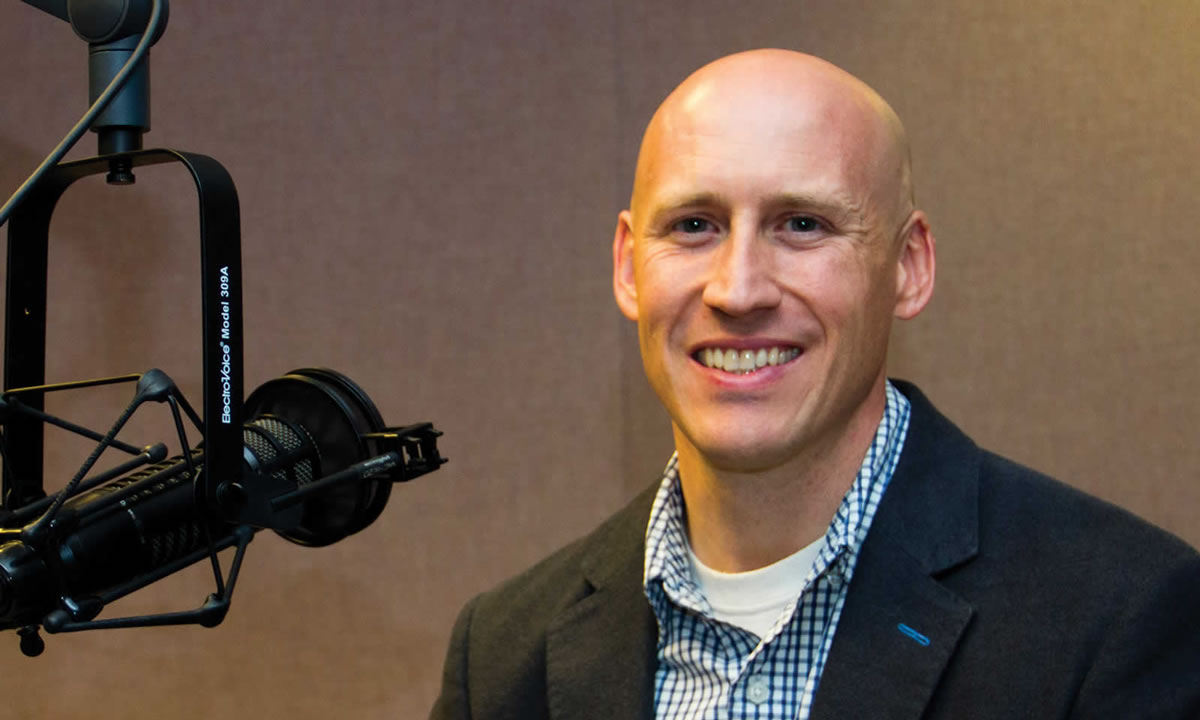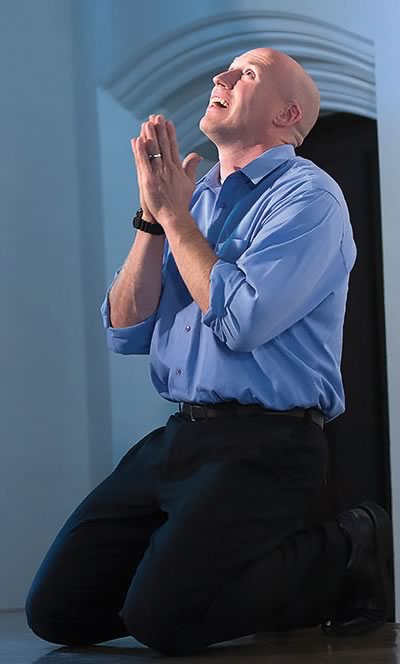
Concordia Seminary Newsroom
Q&A with new Lutheran Hour Speaker

By Travis Scholl
This fall, Dr. Michael Zeigler accepted the call to serve as Speaker of The Lutheran Hour, the legendary radio program of Lutheran Hour Ministries. Prior to this call, Zeigler served as pastor of Epiphany Lutheran Church in St. Louis. But he also is no stranger to Concordia Seminary, St. Louis. In addition to earning his Master of Divinity and Doctor of Philosophy (Ph.D.) at the Seminary, Zeigler has taught classes here and has been a driving force behind the Seminary’s ongoing The Gospel of Mark staged reading tour. He revised his Ph.D. dissertation and published it as the book Christian Hope Among Rivals: How Life-Organizing Stories Anticipate the End of Evil in 2017. You can watch a Concordia Theology interview with Zeigler about the book here.
We recently sat down with Zeigler to talk about his life and work as he looks ahead to his role as the Lutheran Hour Speaker.

How would you describe your experience as a student at Concordia Seminary?
Becoming a student here was something I had been talking about for seven years. When my wife, then girlfriend, Amy, was attending Concordia University in Nebraska, I visited her and sat in on her Christian doctrine class taught by Dr. Paul Vasconcellos. They were studying the Book of Concord, and I loved every minute of it! Amy joked about me asking “Vasco” more questions than the enrolled students. That trip sealed my love for Amy and theology, and talking to Amy about theology. During Seminary, Amy read every one of the many papers I wrote, including the four additional years of doctoral work and my 270-page dissertation. This invited many more theological conversations, which continue today. Those exchanges with Amy, my professors, classmates and field work congregation were the highlight of my time as a student at the Seminary.
How was the experience different from getting a M.Div. and Working toward a Ph.D.?
When I first enrolled in the Ph.D. Program, Dr. Reed Lessing was the director. He underscored the purpose of the program: to train candidates at the highest academic level so that they may provide leadership to both church and world. Those words still weigh heavy on me. The Ph.D. studies were more demanding, but also more focused. Each additional class was a purposeful step toward making an original theological contribution to my area of study. The professors asked more questions and gave fewer answers, a process designed to form us into leaders for church and world. Much of what made it a formative experience was the variety of backgrounds embodied in my classmates. One seminar I took had students from nine countries of origin!
What has it been like to be an instructor at the Seminary?
I’ve enjoyed getting to know the students and seeing them progress in their studies and go on to serve as vicars, pastors and deaconesses. Teaching the faith presents a challenge to each generation. Questions and comments from students and colleagues, current events in the culture and opportunities for the church keep pushing me to refine my presentations and adjust how I evaluate students’ work. I’m starting to appreciate how the body of teaching within the Scriptures remains steady while our comprehension — both mine and the students — deepens.
Talk about The Gospel of Mark presentations in Which you and other Seminary professors and alumni are involved. What Were the production’s origins? What does it show us about Scripture?
The project was an idea that sprang from a Ph.D. seminar I took with Professor James W. Voelz. Drawing on insights about the nature of an oral culture, scholars have suggested that, when the early church got together, it used the text of the New Testament like a musical score. The appointed reader would study it, mark it and inwardly digest it, eventually learning it by heart when it came time to perform it for the gathered listeners. We’re working to re-introduce this practice for the church today.

Dr. Michael Zeigler is part of the Seminary’s The Gospel of Mark presentation team. Photo: Jill Gray
These presentations have become mini-retreats for me. I am the youngest of the group and so blessed to listen to the team’s banter and learn from their long experience serving Jesus and the church. What makes the conversations along the way so delightful is that they always seem to circle back to Jesus and this text of His that’s been hidden in our hearts and keeps spilling out of our mouths. Doing this together for six years, the Lord’s Gospel according to Mark has fired our imaginations, whittled at our quirks and nourished our love for Jesus and His people.
What have been your greatest joys — and challenges — in congregational ministry? How has it prepared you for your role as Lutheran Hour Speaker?
We’ve approached congregational ministry as a family affair. We intentionally bought a house within walking distance of the church, so it’s become a second home for us. My greatest joy has been sharing the Lord’s work with my family and treating the work as something like building up a large, extended family. The challenges are similar to those of being a family, especially when the family is broken, yet still expanding, fostering arrangements and adoptions, inlaws and friends who hang around, but aren’t quite ready to join. What’s special about this family, what makes it different from all others, is that we are centered on Jesus — His forgiveness and new life for the sake of the world. This experience leads me to embrace my role as Lutheran Hour Speaker and a team member at Lutheran Hour Ministries, a global outreach ministry. This is the kind of leadership Dr. Lessing said they were preparing us for! My classmates and I are getting to use our voices across the globe to expand this broken, forgiven, quirky family in Jesus.
What would you want readers to know about your book?
My teacher [Seminary Professor Emeritus] Robert Kolb told us that, when we write, we should not seek to have the last word, but to contribute to the conversation. In Christian Hope Among Rivals, I’ve tried to do that. I’ve listened carefully to the conversation about Christian hope, especially as it’s been documented in churchly and scholarly works of the last 50 years. As I did that, I noticed some things we hadn’t been talking about. So, I’ve said, “Hey, what about this? What if we think about hope as the expectation that the Author of our life story will prove trustworthy — in spite of unexplained evil — in the end?” Putting hope in these terms might help us start some new conversations and, perhaps, with people we haven’t talked to before.
Do you have other Writing plans on the horizon?
I hope so!
Dr. Travis Scholl is managing editor of Seminary Publications at Concordia Seminary, St. Louis.